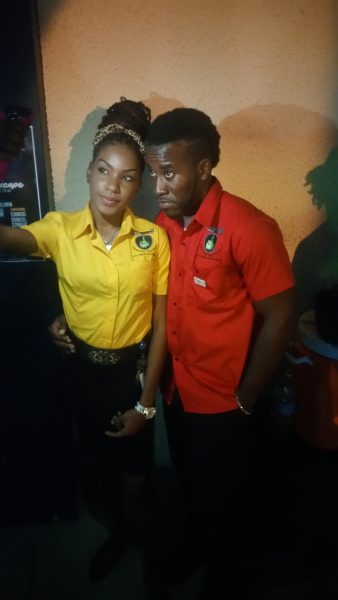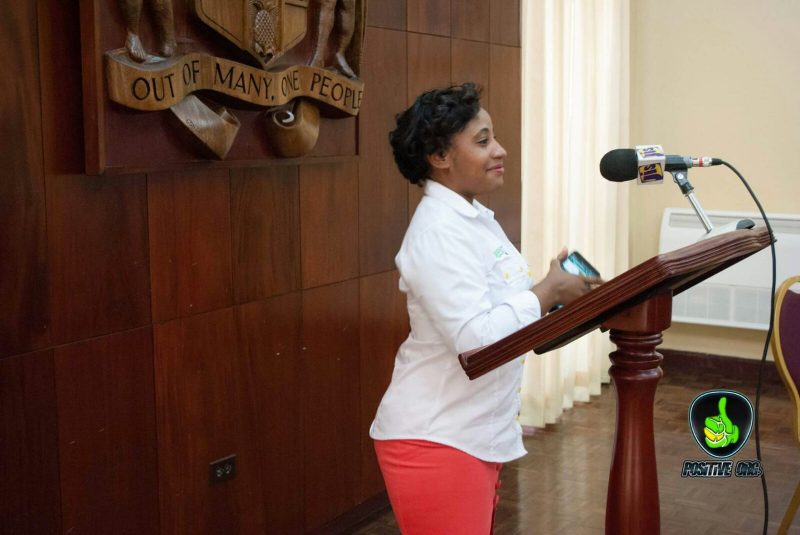
Neville Charlton giving a thumbs up at a Christmas function held at the Golden Age Home in Kingston, Jamaica in 2013. Photo courtesy Emma Lewis, used with permission.
Are the voices of Caribbean youth being heard? Are they being listened to, and what are their concerns? Some youth-led volunteer organizations are beginning to emerge that are seeking to empower young Jamaicans to address their issues head on.
Global Voices recently caught up with Neville Charlton, a Kingston student who founded his own youth volunteer group four years ago called The Positive Organization. It currently has approximately 60 members, mostly in Kingston and its environs. One member in Montego Bay has started her own initiative, Retirement Youths for Change, in the vulnerable community of Retirement; another youth-led group, Okinos Helping Hand, has started working in deep rural St. Andrew.
The group's current president, Samantha Miller, also joined the conversation. Both believe in hard work, have a passion for change and above all, they seek to motivate their peers towards a more activist approach. The challenges, though, are many.
Global Voices (GV): Tell us a little bit about yourself, and how you got into volunteering. What motivated you?

Neville Charlton with Moya Swearing, co-founder of The Positive Organization, at the recent Youth Forum in Jamaica. Photo courtesy the subject, used with permission.
Neville Charlton (NC): I am currently in my final year at the University of Technology, (UTech), pursuing my degree in Communication and Technology. I’m the youth director at the Silverstone Citizens’ Association, a community-based organization in Portmore, which is a dormitory community. In 2014 I won Scotiabank's Community Program Award for my work in this area, where I live. And I founded my own non-profit organisation — Youths Inspiring Positive Change Ja — in 2012. Most recently, I became a Respect Jamaica youth ambassador. I was also an ambassador for I Believe — a youth empowerment initiative of the Governor General of Jamaica.Growing up, I never really saw volunteerism happening around me. Then at church, as a member of the Pathfinder Club, I recognized the need to give back. I am motivated just by seeing the smiles on people's faces. When I volunteer, it's just knowing I am able to help someone in need. Our organization is focused on youth advocacy, empowerment and helping young people to find themselves and their purpose in life. Many young people are losing direction and don't know which way to turn.

Samantha Miller speaking at a youth meeting at King's House, Jamaica. Photo courtesy the subject, used with permission.
Samantha Miller (SM): I am 24 years old. I live by the mantra, ‘If I have the belief that I can do it, I shall surely acquire the capacity to do it, even if I may not have it at the beginning’ — a quote from Mahatma Gandhi. I met Neville some years ago, saw what he was doing and decided to start volunteering. My very first project was a lupus walkathon, and the joy of giving back was immense.My mom always told me I was a challenger of norms and societal norms, so she knew I would be involved in making change. But I was told [by others], ‘You'll always be that girl from Waltham Park Road [an inner city community] and never amount to anything.’ I use all those negative comments to motivate me to be better than my situation and circumstances. I always thought my voice would not count. But I have found my voice now and I’m putting it to use.
GV: This month is Youth Month. Do you think Jamaicans are really listening to the voices of our youth, twelve months of the year? If not, why not?
NC: We have come a far way, I believe. Jamaicans are listening. Our voices have become louder because we are stronger together. But young people are still reluctant to speak up and speak out. Also, the important thing is not just hearing our voices — but listening to what we have to say — and taking action. We still have a good way to go because most Jamaicans are not taking us seriously. They think young people just aren't able to solve the country's problems. Let’s look at the National Youth Parliament, for example. Young people had the opportunity to raise the issues affecting them directly, to advocate and debate them. Now we have identified those critical concerns, let's see if the government will take action.
SM: When I was growing up and questioned the status quo, I was always told by older folks, ‘What do you know? You’re so young. You nuh ready fi dis ting yet, your mind too young.’ But if we really take the time out to listen to them, we get to realize the youth have so much to offer. They are at the forefront of all the issues. We, as guardians, need to create that platform for the youth to be heard and not shut them down. Regardless of age, young people have a lot to contribute to the growth of our nation.
GV: Your event at UTech this week was called ‘Youth Take a Stand’. What do you think Jamaican youth should be taking a stand on, and why?
NC: Take a stand on everything that prevents the positive development of youth. My colleagues have identified crime, peer pressure, bullying, discrimination, education, and gender-based violence as some of the major concerns. There is a lot of negativity going on in Jamaican society. Naturally, children are going to be susceptible to it all — and in many cases, without the guidance they need, they gravitate towards it. So I am telling young people: Take a stand against it all, and be true to yourself, because only you know your worth to society. You must create your own story, so make it an inspiring one. It doesn’t matter where you’re from, all that matters is where you’re going.
SM: Originally, ‘Youth Take a STAND’ stood for ‘Stay True And Never Deviate’. It means taking a stand on everything that is impacting us negatively. Taking a stand means accepting yourself, being strong enough to accept who you truly are. Taking a stand against bullying in schools. Taking a stand when people say you’re from the ghetto, so you not going to be anybody. My favorite movie quote is from the Will Smith film, The Pursuit of Happyness: ‘Don't ever let someone tell you that you can't do something. […] When people can’t do something themselves, they're going to tell you that you can't do it. You want something, go get it. Period.’
GV: What do you see as the benefits of volunteering? What is the point, if you don't get paid?
NC: (Laughs.) I don’t need to get paid. Volunteering gives me a feeling of empowerment; knowing I am able to help someone who is just seeking a helping hand…my hand is available. Volunteering makes me feel good because I am doing something for others. It helps me to respect other situations humans find themselves in. I volunteer knowing that I can help to give back to my community and my country; it's a way to show gratitude for the help I have received from others. Jamaicans are experiencing grave economic difficulties and many have little hope for a bright future. Realizing this, I teach myself to be more focused. I know there are people going through much worse than I am. Volunteers make our communities safer; they stand up for human rights and lobby for positive change at local, national and international levels. Their collective efforts can make Jamaica a more vibrant, healthy country. Making our country safer is the greatest benefit.
SM:: I get to meet amazing, like-minded persons. I get to talk a lot without the fear of being shut down. I share my ideas, and I feel that my input is valued. I definitely don’t do it for the monetary reward. To make a general impact on someone’s life is all the reward I need — to listen to what they have to say and steer them in the right direction. I want to see a Jamaica that my nieces and nephews can call home, without the fear of going through what I went through. To be heard and feel valued. And that is what I try to achieve every time I meet new people.

Samantha Miller (front, far left) with volunteers from the Positive Organization group. Photo by the author, used with permission.
GV: Who inspires you?
NC: My aunt is my greatest inspiration. She has molded and shaped me into the young man I am today […] taught me the importance of being independent, honest and self-reliant. She is no ordinary woman.
SM: My mom. She’s so humble and kind. She makes the best of every situation. Growing up in a single parent family was hard, and I saw her struggles. When I was a child I remember saying, ‘Mommy, I'm going to make you proud.’ I admire her strength and her willpower and I want to be exactly like her. My other inspirations are my nieces and my nephews. I hope to make them proud as well. I want to be an effective role model for all of them.
GV: Do you have hope for Jamaica's future? What would you like to see? And how do you see yourself in ten years’ time?
NC: Yes, I do have hope. Jamaica's future looks bright, despite the challenges of unemployment, crime and education. We have energy and youthful exuberance, so more young people are becoming active agents of change. There is still much work to be done, especially in the areas of discrimination, equality and gender-based violence. However, we need to get every Jamaican to buy into the goal of Vision 2030: ‘Jamaica, the place of choice to live, work, raise families and do business.’
In ten years’ time, I want to be able to say I helped change things. I love the media; it's such an important tool. I would like to be running my own marketing and PR company — one that can embody my philosophy, inspired by Mahatma Gandhi: ‘I must be the change that I want to see in the world!’
SM: My hope and vision for Jamaica is as a nation of opportunities, one in which we are not defined by our situations, our circumstances, where we live. I also hope to see a nation where we are free to express ourselves. And I want to see a nation no longer overcome by crime and senseless violence.
In the next ten years, I see myself making immense strides at the community and national level. I have always wanted to be a world leader. I am not one to limit my potential and I want to achieve this goal. I also want to complete my degree and inspire young minds.
I always tell people: The world is your oyster. It's up to you to find the pearls.







1 comment
Our voices combined can have a great impact.